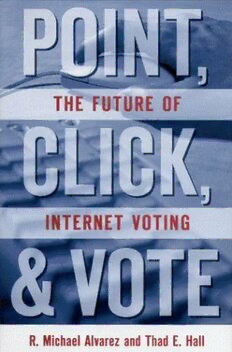
Point, Click and Vote: The Future of Internet Voting PDF
215 Pages·2004·0.688 MB·English
Most books are stored in the elastic cloud where traffic is expensive. For this reason, we have a limit on daily download.
Preview Point, Click and Vote: The Future of Internet Voting
Description:
Whether voting for their favourite pop singer or responding to a survey about the news, Internet users have come to treat informal online polls as regular web fixtures. Now, proponents of electoral reform are urging consideration of remote Internet voting to determine its likely impact on American elections. Advocates argue that Americans are well suited for Internet voting since they are eager to make use of new technology and have a high level of access to the Internet. It could also increase voter participation among young people and working Americans, and yield a better-informed electorate. However, many opponents of Internet voting raise significant concerns about the security of votes cast online, Internet accessibility across socioeconomic lines, and the civic consequences of making voting possible at the click of a button. This book offers a realistic plan to put pilot remote Internet voting programmes into effect nationwide. It addresses many of the important questions raised regarding security, accessibility, and impact on American civic life. It examines several examples of remote voting (Internet and otherwise) already in place in America, including Oregon's vote-by-mail system and online primary elections in Alaska and Arizona. This book explores the ways in which Internet voting could alter the future of American elections.
See more
The list of books you might like
Most books are stored in the elastic cloud where traffic is expensive. For this reason, we have a limit on daily download.
